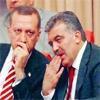Playing Kurdish card
Hurriyet Daily News with wires

refid:10683033 ilişkili resim dosyası
The campaign for local elections where the Kurdish issue is likely to be a regular feature opened yesterday, as the prime minister knocked down one taboo by using Kurdish words in a national television broadcast as critics erected new boundaries for using such symbolic language. Meanwhile, the pro-Kurdish opposition sought to up the ante in Turkey's prime cultural war.
Long anticipated, Recep Tayyip Erdoğan's pre-recorded interview was aired at 7 p.m. last night as part of the inauguration of the country's first 24-hour Kurdish language TV channel. Erdoğan, in an interview aired on TRT 6, of the state-owned Turkish Television and Radio Corporation, said: "Best wishes to TRT 6," in Kurdish, which is, "TRT Şeş, li ser xere be."
TRT 6 is being promoted as a culture and family channel that will mainly use the Kurmanchi dialect of Kurdish. There will also be shows in the Kurdish dialects of Zaza and Sorani, it was noted on TRT’s Web site yesterday.
"I believe this will allow further steps to be taken in the course of time. Because as you know, in such matters, the private sector waits for the state’s lead," he said. He asked for patience, adding that the TRT would act as a school and would train many professionals.
The official opening of the TRT 6 channel began at 7 p.m. yesterday, after the Hürriyet Daily News & Economic Review went to press.
In another pre-recorded message, President Abdullah Gül, a former senior member of the Justice and Development Party, or AKP, is also said to have used Kurdish words.
No end to restrictions
But Erdoğan's move, widely regarded as a move to bolster flagging support for his Justice and Development Party, or AKP, in the southeast, hardly signaled an end to restrictions on the use of Kurdish.
In a set of regulations published in the Official Gazette, the election watchdog, the Supreme Election Board, announced that it would be illegal to use any language but Turkish in the election campaign for local elections scheduled for March 29.
Ruling Justice and Development Party’s, or AKP's, deputy leader Abdülkadir Aksu, who is in charge of Kurdish initiatives, said it was the birthright of all to speak in their mother tongue, adding that the government believed TRT 6 was a precious step in the process of improving the democratic rights of people.
Aksu also said he was especially happy about the fact that the TRT 6 would broadcast around the clock.
The 24-hour broadcasting by TRT 6 contradicts the law that limits the hours of broadcasting in Kurdish for private channels to four hours a week.
The pro-Kurdish Democratic Society Party, or DTP, and the AKP are seen as the only national parties with any political presence in the southeast. In the local elections in 2004 and the general elections in 2007, the AKP and the DTP were the only parties that won any posts. TRT 6 channel is seen by the DTP as a ruse by the AKP to win votes on the eve of the local elections.
DTP ups the ante
Meanwhile, the DTP, quickly seized on the opening to introduce a demand to add letters unique to Kurdish to the official Turkish alphabet, a proposal guaranteed to draw the wrath of many nationalists.
The Democratic Society Party, or DTP, is preparing to propose a law that will allow the use of the letters, Q, W and X in official correspondence.
The use of these three letters are banned in official correspondence because they are not included in the Turkish alphabet.
According to daily Taraf, DTP deputy Hasip Kaplan said they were readying a draft law that would allow the use of Q, W and X. "If the law passes, many problems will be resolved," said Kaplan, noting that even their applications for the coming of spring festivals were rejected by governor’s offices because Nevruz was written as, "Newroz."
He noted that many Kurdish publications were banned for the same reason.
Former parliamentarian and a DTP member Mahmut Alıcak is only the most recent casualty of the letter ban. He has been found guilty of violating the law that bans the use of any language other than Turkish several times. One case involved him playing a Kurdish song during an election rally and another for sending a letter in Kurdish to the prime minister. The letter was later included in the indictment against the DTP, which currently faces a closure case in the Constitutional Court.
He was sentenced to six months in prison for posting a sign in Kurdish on World Women’s Day. His last sentence involves the DTP’s 2007 Nevruz statement, which was seized because it included the letter "W."
When asked about TRT 6 by daily Radikal, Alınak was suspicious, arguing, "The state started the Kurdish broadcasts only because the ban on Kurdish became untenable."
DTP’s Diyarbakır deputy Gültan Kışanak, who is preparing a law that allows the use of Kurdish in the public arena, welcomed TRT 6, but noted that they wanted the broadcasts to have a legal basis so that private televisions could follow suit. "If there is a right, it should not be in the state’s monopoly," said Kışanak.
According to the Doğan news agency, there are currently 14 channels in Kurdish broadcasting from Iran, Iraq and Europe, with four of them linked to the terrorist PKK organization.
